#matthías tryggvi haraldsson
Text
Matthías interview on quitting Hatari - translation
Some sad news in Fréttablaðið today. The tl;dr is that Matthías is quitting the band to focus on being a father, but this is not necessarily the end of the band. Translation below the cut.
Matti quitting Hatari - trading in the leather suit for a dad sweater
[Image caption: Matthías holds his daughter Sóley on the photo on the right. He says the high point of his week is to see her dressed in this cute strawberry outfit.]
Musician, playwright and copywriter Matthías Tryggvi Haraldsson has decided to leave the band Hatari which he has worked with for the past few years. He aims to concentrate on being a father but says it's impossible to quell his creative spark.
"I basically realized when I became a professional singer that I get no real joy out of singing for people," says Matthías, who recently became a father. He says the fatherhood role has changed how he prioritizes his life.
"When you have a child you start to prioritize and you just have to do what you want to do," he says. Matthías currently works as a copywriter at advertising agency Brandenburg.
"Being a father in a 9-to-5 job is my primary objective right now. Of course, writing is never too far away. I've got a movie script churning away and another theater translation as well," says Matthías, who says it was a surprise that he'd ended up as the frontman of a popular band.
"It wasn't really ever the plan to become a singer. But of course Hatari was a fantastic idea and this doesn't necessarily mean the band is breaking up," says Matthías, who says the members of the band understood his decision and Hatari's fans won't have to despair, as the band will continue.
"It's a rollercoaster that has taken me places I never imagined a person could go."
The performance took on a life of its own
Hatari has for a long time been a name nationally known by both children and adults, especially after the band represented Iceland in Eurovision, which brought them international fame.
The band, which could be classified both as a traditional band and as performance art, quickly became known for its live staging and cool costumes. Matthías says the idea of the band took on a life of its own early on.
"It was performance art that kind of lived its own independent life and went faster than anyone could imagine or control. It just happened and took on a life of its own. It seems to have just been in the right place at the right time."
Diverse influences
The band originated with Matthías and Klemens Hannigan, who also sings in the band.
"It was really Klemens who was the reason we started doing anything to begin with. He sort of ordered me to scream something into the microphone the day we got bored of playing Civilization at his house," says Matthías, but also that he was writing a lot of poetry at the time, much of which made its way into the band's songs as lyrics.
"I was writing a lot of poetry at that time, and I was in a group of young poets that were a great inspiration to me. But also the band Laibach was always behind the ear," says Matthías. That band has been widely influential across a diverse flora of bands in the so-called "industrial" genre; among others, it was a great influence on the band HAM in its time.
Wanted to deceive the audience
Another thing that directed Hatari's creativity was their goal to deceive and defy the expectations of their audience, which was an effort to refuse to let the band be pinned down as one thing and gave them a lot of creative freedom.
"We were always trying, secretly and openly, to defy the audience's expectations. When we'd been stamped as a satellite of the heavy metal scene in Iceland, we went and cut off the long hair," says Matthías. Of course, this was also part of the band's role when it participated in Eurovision.
"The audience's expectations for Eurovision are of course as they are, and we perhaps don't exactly fit like a glove there," he says.
The warm blanket of late capitalism
Matthías has worked a wide variety of jobs over the years, both as a playwright, dramaturge and lyricist, but he also recently applied for a job as the programming director of Rás 1 [Channel 1 of the Icelandic state radio broadcaster].
"It's a radio station I have a great affinity and affection for, and I've previously made a radio series called Allir deyja [Everyone Dies]," says Matthías, who first got involved with radio as a news reporter.
"I've been a host at RÚV, but I first got involved with it through the newsroom when I was a news reporter. But I have strong feelings about the cultural role that the state broadcaster serves," he says.
When asked if it's hard to satisfy his desire to create in a traditional job, he says it is complicated but inspiration can be found in many places.
"The desire to create doesn't go anywhere, and I'm reading stuff in the evening after the girl's asleep and taking Fridays off and finding little chances where I can to work on scripts and translations and other things. The playwright and screenwriter doesn't die so easily," says Matthías, who also finds inspiration in his current job. "There's also creativity in writing advertisements for random companies. It's more fun than you might think, and especially in good company like I have at Brandenburg," he says.
When asked if the frontman of the anti-capitalistic band Hatari has now fallen for good for the ideology of libertarianism and market forces, he says so.
"I'm heading into the warm blanket of late capitalism," says Matthías who looks forward to experiencing its comforts. "All I crave now is safety, stability and disposable income to take vacations. Those are all ideas that were very alien to me less than a year ago. The rhythm of my life has taken kind of a U-turn, and I don't feel like taking weeks to rock and roll abroad fits into that new rhythm. But it was a fascinating experience to do it when I did."
139 notes
·
View notes
Text
14 Ár @ The Manchester Club Academy 15/07/22
specifically the part where Klemen’s character is a manipulative bastard
#hatari#14 Ár#hatari concert#klemens hannigan#matthías tryggvi haraldsson#Hatari band#if you can hear me crying in the background of this NO YOU CAN’T
37 notes
·
View notes
Text
Hatari Clown Squad wake the fuck up
#i knew he had to get a job for that baby!#hatari#hatari clown squad#matthías haraldsson#matthías tryggvi haraldsson#klemens hannigan#einar Stefansson#sólbjort#àstros
38 notes
·
View notes
Text
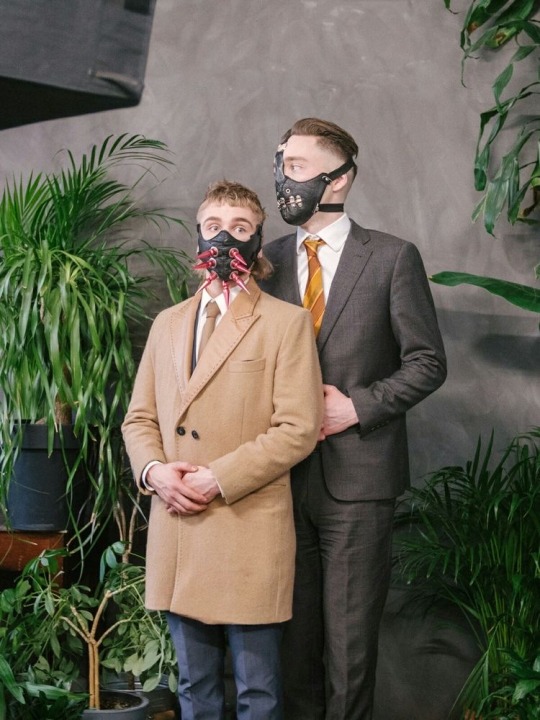

#HATARI#THE REYKJAVIK GRAPEVINE#Klemens Hannigan#Matthías Tryggvi Haraldsson#the masks being switched but the same 🥲#hatari cousins#hatari band
10 notes
·
View notes
Video
Europe will collaps the day they show these trousers some mercy and throw them in the bin
-
source: @jamidaniell insta stories 2/7/22
#hatari#hatari-costumes#matthías tryggvi haraldsson#matthías#MyPost#we see holes they see nature's pleather ventilation#pls just wear fishnets like normal people
15 notes
·
View notes
Text

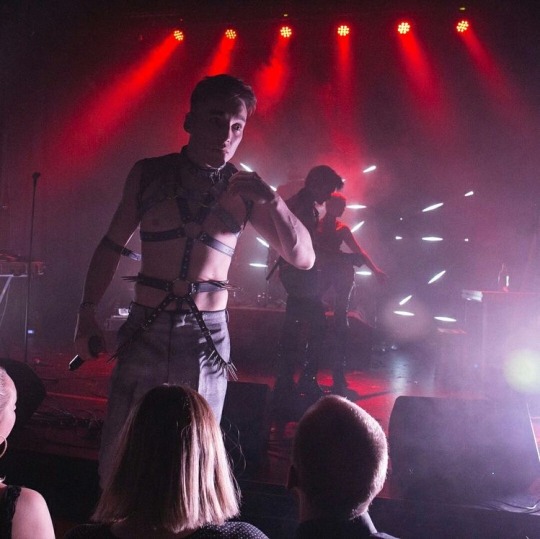
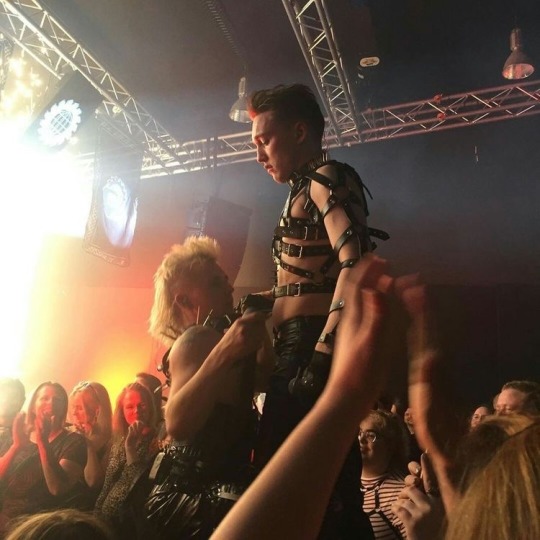

matthías tryggvi haraldsson, hatari
#hatari#matthias haraldsson#klemens hannigan#einar stefánsson#iceland#icelandic rock#rock#rockstar#techno#band#the neighbourhood#tumblr aesthetic#2014#deftones#girl blogger#alternative girl#girlblogger#2014 tumblr#hatrið mun sigra#eurovision#eurovision 2019
30 notes
·
View notes
Text
Hey Hatari, Björk & Sugarcubes Fans!

Wanna support a great cause in saving Icelandic? Sign the petition to save Icelandic!! ALSO join the Discord I made for all things Icelandic! And YES there's a place where you can share about Hatari, Björk, Sugarcubes only! :)
Also if you'd like to become an Admin or Moderator DM me here on Tumblr, or on my Instagram: @frosti_alien
We need all the help we can get!!
#hatari#matthías tryggvi haraldsson#Klemens Hannigan#Einar Stéfansson#icelandic band#icelandic#iceland#icelandic music#bands#hatari iceland#eurovision#icelandic language#Björk#bjorkfan#bjork gudmundsdottir#bjork#the sugarcubes#Sykurmolarnir#Icelandic musicians#björk guðmundsdóttir#lgbtq#lgbtqia#lgbtq friendly
12 notes
·
View notes
Text
Sometimes you just gotta yell at ur slutty cousin from a distance while he gets a semi-lapdance
#hatari#iceland airwaves#matthias was social distancing from klemens horniness#matthías tryggvi haraldsson#klemens hannigan
65 notes
·
View notes
Text

#depression and stuff#matthías tryggvi haraldsson#klemens hannigan#einar steffanson#hatari#bashar murad#europe will crumble
157 notes
·
View notes
Photo





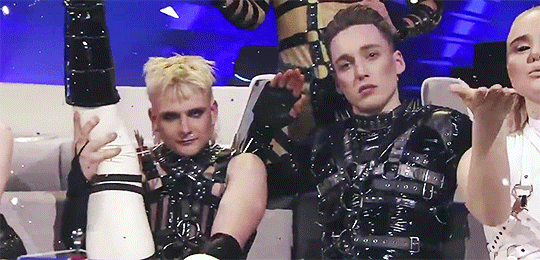
- Are you good at partying? Generally?
- We‘re OK at partying. I’m sorry, please edit this comment out. We choose not to comment on our partying skills at this point. Political reasons.
#hatari#iceland#eurovision#hatari being hatari#i love these goofs#Matthías Tryggvi Haraldsson#Klemens Nikulásson Hannigan#Einar Hrafn Stefánsson#mine#gif:other#esc 2019#idk whats this gifset is supposed to be i just need to make something with them#gif:500#gif:1k
2K notes
·
View notes
Text

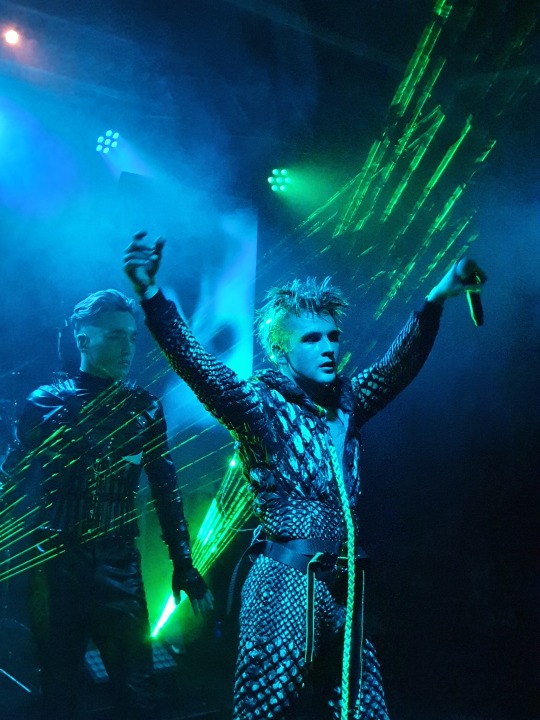



Hamburg post Hamburg post Hamburg post
#hatari#matthías tryggvi haraldsson#matthías haraldsson#klemens hannigan#einar#einar stefánsson#klemens#matthias#europe will crumble#hamburg#concert#it was so great#i want to go back
61 notes
·
View notes
Text
Matthías on Vikan með Gísla Marteini, 15.12.23
Another translation request I missed: Matthías was on Vikan með Gísla Marteini before Christmas, the other guests being Jón Jósep Snæbjörnsson or Jónsi, who competed in Eurovision on Iceland's behalf both in 2004 and 2012, and actress, screenwriter and director Tinna Hrafnsdóttir. The discussion touched on Palestine and Eurovision boycotts (at this point Matthías would have already been involved in Bashar Murad's Söngvakeppnin entry, but keeping it under wraps), Matthías's shift from the toughest guy around to a soft family man, his current job as a dramaturge for the National Theater, Christmas traditions, and Danish.
I fully translated more of this show than I really should have; it took ages and I should've tried to summarize more of the non-Matthías bits, but there was a lot of Matthías scattered throughout. Oh well. Hope you all enjoy hearing more from him, at least!
During the introductions, Gísli Marteinn says two of the three people on the couch have their names attached to bands they're no longer part of; he'd wanted to say "Jónsi í Svörtum fötum" (referring to Jónsi's old band Í svörtum fötum) and "Matti í Hatara" (Matti from Hatari). Matthías says "Skellur," which we could translate as, "That's rough." Gísli Marteinn affirms that neither would be correct. Jónsi says "What are we even doing these days? Are we doing anything these days?"
Gísli Marteinn mentions that last time Matthías was on the show, he was going to say he's no longer part of Hatari, but then they forgot to talk about it. Matthías goes "Oh yeah, right. That was supposed to be the big news." But Gísli Marteinn says they're all here because of the interesting stuff they're currently working on.
The show moves on to other things for a while, but we pick back up with them later, after a segment where Gísli Marteinn goes through the news of the week and makes jokes about them.
After a bit of banter with Jónsi about how Gísli Marteinn's dad jokes would have gotten him canceled many times over at Jónsi's dinner table (Gísli Marteinn says more dinner tables than his would) and a bit more talk about how they're all doing such exciting things, Gísli Marteinn moves on:
GÍSLI MARTEINN: There's one issue we didn't mention there despite being prominent in the news, and that's that we're watching the horrible actions of the Israeli army in Gaza, and it makes it hard to quite get into the Christmas spirit. And into that comes this discourse about Eurovision, which is unusual but understandable. I mean, we have two Eurovision-goers here--
JÓNSI: Uh oh.
GÍSLI MARTEINN: I mean, in both of your cases there was talk of whether we should boycott. And Matti, you went to Israel. You had a message to Israelis. When you watch this discourse, what do you think?
MATTHÍAS: Well, I think it would be very courageous and good of RÚV to send a clear message. I mean, let's imagine that after the invasion Russia had competed in Eurovision, but Ukraine hadn't. It's a bit like that, from my point of view. Israel is competing but Palestine isn't. I think either there should be a rule that while there's active warfare going on you shouldn't be in this contest that's supposed to be about peace. Or you could pull out more flags, Palestinian flags, and include Palestine. I think that would be a neat thing to call for. But the boycott movement is very important, of course, even though we didn't quite follow it when it was our turn.
GÍSLI MARTEINN: Right, they wanted you to boycott.
MATTHÍAS: Yeah. But boycott is a silent action. A bunch of people boycotted the contest when we were competing; people just didn't hear about it because they weren't recorded anywhere. We went a bit of a different route, but that's not to diminish this important movement.
GÍSLI MARTEINN: No. It's a complex matter. Everyone who insists this is simple perhaps doesn't see every side of it.
MATTHÍAS: No, it is complicated. But it's also very simple. I mean, what's happening now in Gaza is just -- I think people don't realize because they're so used to hearing news about this in their ears, the region of Palestine, but this right now is just -- I'm not going to completely kill the Christmas spirit in the show, but this is so much worse than ever before, ever in the history of Palestine. And that's going on right now.
GÍSLI MARTEINN: Yeah, absolutely. And I didn't mean to say that that's particularly nuanced - of course that's simple, in itself.
MATTHÍAS: Yeah. But then you get everything else, which is complicated, of course.
GÍSLI MARTEINN: Jónsi, even when you went, even though it wasn't the Israeli-Palestinian conflict, I remember a call for you to boycott.
JÓNSI: Yeah, there was.
GÍSLI MARTEINN: Namely, you went to Baku in Azerbaijan.
JÓNSI: Yes, it was 2012, and I think that was… It's been a while, and I'm sorry, there are probably a lot of people who know a lot more about this than I do because I perhaps tend to just try to forget these kinds of things and do something else. Please excuse me, I'm sorry. How often have I apologized now?
GÍSLI MARTEINN: A lot!
MATTHÍAS: Like he said, there's no wrong thing to say on this show.
JÓNSI: Right, thank God. Wiener dog.
[laughter]
JÓNSI: No, sorry. There was discourse about how there are human rights abuses going on down there, and we became aware, the group that went, me and Greta Salóme and more, that there were people who were asking us to show solidarity in action. And it was very hard, just sort of being between a rock and a hard place. I hadn't been imagining that this was something I would be tackling - aside from the fact I was probably just a privileged dude, being pampered out there. But by finals night, we really felt like we were in a bind. It was weird to be about to compete for our country and make everyone proud, on the one hand, while knowing that there were people who, from the literal safety of their armchairs in Iceland, wanted us to do something different. And it was always a bit unclear exactly what should be done -- you get so many possibilities, and you don't really know how to react because you think it's not going to matter at all what you do, and you're always going to make someone mad. Just like how you can no longer do a good deed and tell anyone about it, because then it's time to tell you off for trumpeting it. You feel like there's no right chess move to make, these days. But nonetheless, I don't want to minimize that there are horrible things happening in Gaza, and it's weird to feel that political angle coming into the music world. But I'm not an expert on it, I admit.
GÍSLI MARTEINN: Of course, and you weren't brought here to opine as an expert. But it's necessary to discuss it. And -- Tinna, we were talking before the show about how it's hard, or you feel guilty for being in a good mood, or a Christmas mood.
TINNA: Yeah, it's a different Christmas season than often before, almost like you don't dare to be happy because there's so much going on.
GÍSLI MARTEINN: But you, artists and entertainers, putting on shows and making music and creating TV shows that are meant to delight us -- give us some good message about how we can do both at the same time.
MATTHÍAS: You're commissioning a message from us?
GÍSLI MARTEINN: Yes. You were brought here to be…
MATTHÍAS: You can do both.
JÓNSI: Can't we just make it a message, like kop28 [I'm not sure what he's referencing], we're trying to show you some message that doesn't really mean anything by itself? I do realize that if I breathe here in Iceland, that doesn't really change much in Gaza. But I think we should keep talking about it, but I'm also an advocate for focusing on the good things. We should work from the good that exists in the world, and try to say, isn't the influence of good better down there than not? Maybe it doesn't affect anything, I don't know. But…
GÍSLI MARTEINN: Be joyful, but don't forget about Gaza. Is that the message?
JÓNSI: A good T-shirt.
MATTHÍAS: Yes. If you want the core message, it's that.
GÍSLI MARTEINN: To be joyful but don't forget about Gaza.
MATTHÍAS: Yes, you've got it.
GÍSLI MARTEINN: Now we move to other things. Thank you for giving a bit of where your minds are at with all of this. I know it was a heavy beginning, but sometimes that's necessary.
JÓNSI: Yeah, it's necessary. That's quite true.
GÍSLI MARTEINN: Should I talk about the clothes of the men on the couch next? You're both wearing Icelandic wadmal.
MATTHÍAS: You bet!
GÍSLI MARTEINN: Is this the latest fashion trend?
MATTHÍAS: I got married in this, this summer, so I just decided to use it.
GÍSLI MARTEINN: It looks great!
TINNA: They specifically asked me to sit in the middle so that they wouldn't be side by side in tweed.
GÍSLI MARTEINN: That would be tacky.
JÓNSI: My friend Gunni at [clothing store] Kormákur og Skjöldur is very happy with us both, no doubt. But he doesn't realize how ridiculously warm it is under this, and we had a heavy discussion earlier, and they had to make up my ears twice so they wouldn't get red, and it's all just firing up now.
They move on to talking with Tinna about her new TV series Heima er best, which they compare to sort of an Icelandic Succession, which was just nominated for the Nordic scriptwriting awards, and then about when Jónsi and Tinna co-starred in Grease and then in Ávaxtakarfan ("The Fruit Basket", an Icelandic children's musical about bullying featuring anthropomorphic fruit). To stay sane after writing up all this I won't translate this whole section since Matthías doesn't have much to say in it, although he does express surprise that they had theatrical productions during the summer (Grease was an indie production that just kind of rented the City Theater over the summer).
GÍSLI MARTEINN: Speaking of your former lives and such… Matti, when you went to Eurovision and were Matti the Hater [Hatari], I would have said you were just about the coolest, toughest guy in the country. Then fifteen minutes later you're on your knees at Sky Lagoon proposing to your wife and had become so soft and tender and beautiful and in love, and now you've got a kid and another on the way.
MATTHÍAS: Exactly.
GÍSLI MARTEINN: Was Matti from Hatari all fake, or did you just change that much?
MATTHÍAS: Mmm, I've always been soft. The other stuff is a bit of a costume. But of course it softens you when you're in love, and softens you more when you love your child. So maybe that's the Christmas message you were looking for.
GÍSLI MARTEINN: I knew you had one in there!
MATTHÍAS: No, definitely. I was on my way home from work earlier and my sister-in-law who was babysitting called me and said, "Sóley has pooped everywhere!", and I found it to be good news, because I like hearing news of my daughter but also, "everywhere" means some of it went in the potty, so I was kind of just, "Score!" to hear that message. It changes a bit… You've got new and exciting stuff to deal with. It's wonderful. And I'm looking forward to having two. It'll be… Two girls!
GÍSLI MARTEINN: Oh?
MATTHÍAS: Yeah, it's a girl.
GÍSLI MARTEINN: I can recommend having two girls!
TINNA: I'm lucky to have two - twins. Two for one in my case.
MATTHÍAS: So you were quick.
TINNA: Just finish it all in one.
JÓNSI: In one evening, or?
TINNA: One evening! All in one, one evening.
GÍSLI MARTEINN: How old are your twins?
TINNA: They're eleven. And when I told them I was going to sit on a couch with the Hatari guy, they were like, "Wow, Mom!"
GÍSLI MARTEINN: If you've got twins, is the hardest part over, or is it only over when they're about thirty?
JÓNSI: Good question.
TINNA: I'm actually very lucky. They're very good friends and mesh together well, so it's gone pretty well for us. But then you never know what the teenage years will be like.
GÍSLI MARTEINN: Right. We're making our way there.
TINNA: We're making our way there.
JÓNSI: But doesn't that make you alone against them, and then there's two of them?
TINNA: There are some plots going on that I don't quite know about, but I try to keep up the radar.
JÓNSI: A lie detector.
TINNA: Yes, and a lie detector and everything. They're watching me right now; they're probably going "Oh my God, Mom, don't talk about us!"
MATTHÍAS: And do you use these plots to write your scripts?
TINNA: Oh, yes, definitely.
JÓNSI: I also… How old are they?
TINNA: Eleven.
JÓNSI: What are their names again?
TINNA: Starkaður Máni and Jökull Þór.
JÓNSI: I'm going to look into camera two: Starkaður Máni and Jökull Þór, if you aren't good until Christmas, Matti from Hatari and Immi the Pineapple [Jónsi's character in Ávaxtakarfan, the tyrannical villain] are coming to your house.
[laughter]
MATTHÍAS: Correct.
They go to commercials. When we return to the show, Jónsi has brought out a guitar and is enthusiastically leading the audience in singing Christmas songs.
GÍSLI MARTEINN: Jónsi formerly of Í svörtum fötum decided to keep everyone pumped while we went to commercials -- while capitalism took its share, since you didn't manage to bring it to its knees, dear Matti.
MATTHÍAS: The boys are working on it.
GÍSLI MARTEINN: The boys are working on bringing capitalism to its knees.
They talk about Jónsi and his wild success as a pop star in the early 2000s and how now he works for a financial corporation. He describes how fame and being surrounded by people who worship you almost regardless of what you do just kind of isn't healthy and he had just become kind of a dickhead, and he withdrew from it all to get away from it.
MATTHÍAS: But Gísli, you're one of those exceptions. You've been famous for a long time but you're not a dickhead. [He says a few more words that I can't make out over the laughter.]
GÍSLI MARTEINN: That's the best compliment I've ever gotten! Thanks, Matti, I'm grateful you say that. But back to you, you said earlier you were on your way home from work. Where do you work?
MATTHÍAS: The National Theater!
GÍSLI MARTEINN: I mean, you aren't Matti from Hatari anymore.
MATTHÍAS: No, I'm Matti from the National Theater!
GÍSLI MARTEINN: Matti from the National Theater! Who doesn't know Matti from the National Theater?
MATTHÍAS: Hopefully more people know now!
GÍSLI MARTEINN: We know you had become a playwright. You wrote award-winning plays. And theater is just your muse right now?
MATTHÍAS: It seems to be that way. The urge to write is still strong in me, and I'll probably keep doing that.
GÍSLI MARTEINN: Don't you have the title of dramaturge, which nobody knows what that is, except Tinna?
MATTHÍAS: The chosen few know.
JÓNSI: Can we know what it is?
MATTHÍAS: Those of us who know what it is recognize each other.
JÓNSI: And no one says anything.
GÍSLI MARTEINN: A secret society!
MATTHÍAS: No, it's translated as 'listrænn ráðunautur' ["Artistic advisor"] for the National Theater, and of course it's the best job in the world. You get to read plays, watch them, your job is to have opinions on theater, talk about theater. You're part of a book club called the project choice committee of the National Theater, and you're in contact with all the directors, and reading scripts that Icelandic playwrights entrust to the National Theater, which is a big responsibility for me because I've been on the other side there.
GÍSLI MARTEINN: Is this your dream job?
MATTHÍAS: It's -- of everything that exists that is a job, this is the best one.
GÍSLI MARTEINN: Very good!
MATTHÍAS: Because the other stuff that I'd want to do even more doesn't exist as a job. It's just freelance. But this is perfect.
They turn to Tinna to talk about her project directing a drama series about Vigdís Finnbogadóttir, former president of Iceland. Matthías mentions he's excited about it and that they compared it to The Crown during the break and that really piqued his interest.
GÍSLI MARTEINN: And speaking of our heritage, you're doing the Edda [Snorra-Edda, the most comprehensive source about the old Norse religion, written in the 1200s] at the National Theater, right?
MATTHÍAS: Yes, I'm working on that as a dramaturge, and it's very exciting.
GÍSLI MARTEINN: It's your Christmas show, right?
MATTHÍAS: The National Theater's Christmas show.
GÍSLI MARTEINN: The Edda in its entirety?
MATTHÍAS: Yes, it's very comprehensive. But it's full of unexpected little twists for those of us who know these stories -- the myths, Thor, Loki, Óðinn and all that. Or for those who don't know and want to get to know their heritage, you're also welcome. But everyone who liked Njála [Brennu-Njáls saga, one of the Sagas of Icelanders written between ~1200-1350 CE] at the City Theater, if you saw that, this is the same director, Þorleifur [Örn Arnarsson]. That was one of the coolest shows I've ever seen, so this should be something.
They move on to a Berglind Festival (comedian) bit about rebranding Christmas. When we return to the studio, she has joined the couch, everyone is wearing sunglasses, and they're each doing some kind of little dance to the Christmas song remix still playing in the background. Matthías says, "You have to warn us if we're going to dance on the show." Gísli Marteinn says, "I didn't see you, did you look like dorks?" Matthías: "I don't know."
GÍSLI MARTEINN: So if we keep to the traditional Christmas, Christmas is next weekend. Do you have any bizarre Christmas traditions, or are you very standard about it?
MATTHÍAS: Speaking of rebranding, my dad… At the Ban Thai restaurant downtown, there's a course called [kung hansa?] [I looked up their menu to try to find out what the correct spelling is but unfortunately the online menu had no name similar to that], a shrimp course, and we find it Christmasy. We often have it as a starter on Christmas.
GÍSLI MARTEINN: On Christmas Eve? [Christmas Eve is the height of the Christmas celebration in Iceland.]
MATTHÍAS: Yes.
BERGLIND: So do you put an almond in the rice? [She's referring to the Icelandic Christmas tradition of making rice pudding and putting a single almond in it, often as a starter; whoever gets the almond in their bowl should try to discreetly remove it and then keep it hidden until the end of the course. If they do it successfully without being spotted, they will receive a special 'almond gift'.]
MATTHÍAS: Uh, no.
BERGLIND: Okay, lame.
GÍSLI MARTEINN: So do you just go to Tómas at Ban Thai and buy it, or do you cook it at home?
MATTHÍAS: We buy it at Ban Thai.
GÍSLI MARTEINN: Wow, well done! How did that start?
MATTHÍAS: We were just at Ban Thai celebrating some milestone, as we do, and then someone said it was kind of a Christmasy taste.
GÍSLI MARTEINN: Very good. Tinna, that's a hard act to follow.
TINNA: I will try my best. We have very firm traditions and always go to my mom on Christmas Eve and eat Danish duck, speaking of Danish Christmas earlier. It's an old family tradition, and we have the Christmas pudding and an almond gift and so on.
GÍSLI MARTEINN: Is Danish duck getting imported?
TINNA: My mom has some secret ways of procuring Danish duck, I'm not going to get into that. In previous years we would sometimes sing afterwards, "Og nu har vi jul igen, og nu har vi jul igen, og julen varer helt til påske." [Danish: "And now we have Christmas again, and now we have Christmas again, and Christmas lasts all the way until Easter."] Do you know it?
GÍSLI MARTEINN: No!
TINNA: It's some Danish song. I love the lyrics - og julen varer helt til påske.
JÓNSI: I said that at the start of the show.
TINNA: Wouldn't that be great, just having Christmas all the way until Easter?
GÍSLI MARTEINN: Christmas until Easter, definitely!
MATTHÍAS: Now you, and earlier there were some people in the audience talking about flødeskum [whipped cream], and you [Gísli] earlier with leverpostej [Danish liver pâté] -- do people generally just speak Danish--
JÓNSI: Danish is taking us over.
MATTHÍAS: --at least at Christmas?
GÍSLI MARTEINN: Don't we? I mean, it's all Danish traditions we have here.
MATTHÍAS: It sounds great, at least.
GÍSLI MARTEINN: It sounds great. Jónsi, the pressure is on.
JÓNSI: Så man sidder i sin festlige måde [Danish: "So you sit in your festive manner…"]… No, definitely not.
He talks about his workplace's tradition where they eat as much as they can and simply decide not to gain any weight by sending a message to the cosmos; Matthías doesn't comment further from here.
13 notes
·
View notes
Text








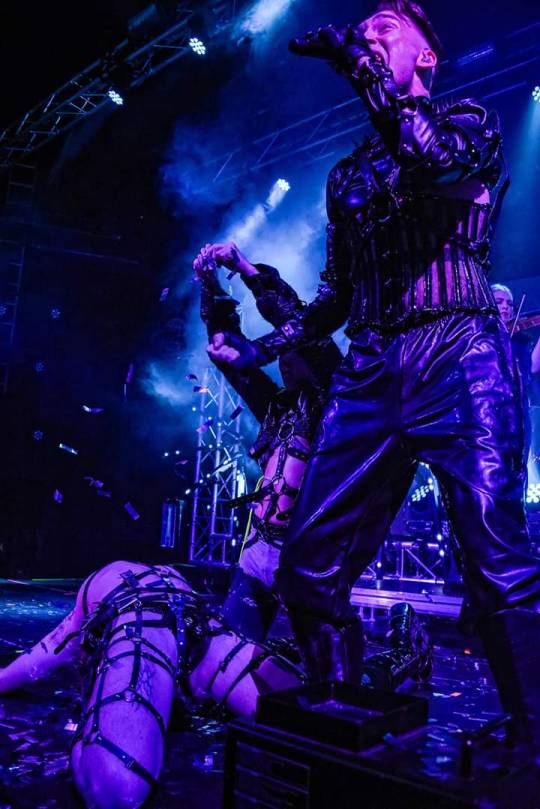

Hatari in purple (2/2)
Release Concert 2020.02.22
Photos by Lolla Sigurjóns
45 notes
·
View notes
Text
my favourite mythical creature is the Dansið Eða Deyið EP
2 notes
·
View notes
Text
Everyone’s talking about how they’re a bit disappointed because dansið eða deyið didn’t end up on the album but y’all...what about toga rap 😔
57 notes
·
View notes
Video
youtube
Engin Miskunn by Hatari from the album Neyslutrans - Director: Magnús Leifsson
#somethingneweveryday#music#hatari#icelandic music#music of iceland#klemens nikulásson hannigan#einar hrafn stefánsson#friðfinnur sigurðsson#matthías tryggvi haraldsson#video#music video#magnús leifsson#baldvin vernharðsson#sigurður eyþórsson#karen briem#harpa einars#atli demantur#gabríel benedikt bachmann#stefanía stefánsdóttir#siggi bahama
10 notes
·
View notes